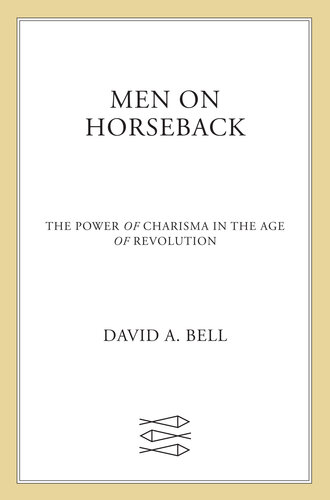
Men on Horseback
The Power of Charisma in the Age of Revolution
کتاب های مرتبط
- اطلاعات
- نقد و بررسی
- دیدگاه کاربران
نقد و بررسی

March 16, 2020
Princeton University history professor Bell (Shadows of Revolution) profiles 18th-century revolutionary leaders Simón Bolívar, Napoleon Bonaparte, Toussaint Louverture, Pasquale Paoli, and George Washington in this fluid and thought-provoking survey of political charisma. Though the movements they led differed in scope and origin, each cultivated a reputation for military savvy, harnessed popular support, and, even in the case of the reticent Washington, molded a persona that continues to resonate. Bell argues that the advent of the Enlightenment, the rise in democratic forms of government, and the increasing popularity of newspapers created ideal conditions for mythologization. Napoleon, in particular, emerges in this account as a propagandist par excellence. Bell skillfully explores the links between his subjects and draws insightful comparisons and contrasts between them (Bolívar, Louverture, and Washington were renowned horsemen; Bonaparte deliberately hid his mediocre riding skills) to reveal that the line between democracy and authoritarianism has always been “vanishingly thin.” This erudite and entertaining “great man” history helps to explain the modern reemergence of autocratic leaders around the world.

March 15, 2020
An examination of hero worship via thoughtful biographies of George Washington and four contemporary leaders who were all idolized at the time. No artist portrayed Elizabeth I or Louis XIV mingling with adoring crowds, but Princeton history professor Bell points out that their nonroyal successors enjoyed a far more personal relationship with the people. They were, in the modern sense, celebrities. Ordinary citizens, writes the author, "could feel a powerful emotional connection to them--a connection heightened by their sense of the figure's sublime, transcendent, extraordinary qualities." The first--and least-known--of Bell's men on horseback is Pasquale Paoli (1725-1807), a Corsican who fought for his island's independence and became celebrated as the first apostle of liberty, aided by James Boswell's worshipful bestseller, written long before his biography of Samuel Johnson. George Washington became America's icon upon his appointment as commander in chief, and "even 240 years later, it is easy to take this initial surge of idolatry for granted." Bell agrees with historians that his sense of transcendence was mostly a facade but admits that he alone of the five achieved long-lasting success. Napoleon referred to himself as the Washington of France, but he was merely a brilliant general; like most talented generals who don't die prematurely, he self-destructed. Sim�n Bol�var (1783-1830) was the Washington of South America because he fought for his people's freedom. Sadly, his elevation occurred after his death because the independent nations hated his attempts to rule, and he ended life reviled and alone. In Haiti, Toussaint Louverture (1743-1803) led a bloody slave rebellion that won admiration in revolutionary France, which subsequently outlawed slavery in its colonies before Toussaint's death under the rule of Napoleon, who tried, unsuccessfully, to reinstitute it. Bell concludes that the rise of autocrats today indicates that charismatic leaders, especially those who maintain that achieving national glory trumps boring institutions like laws, are finding a receptive audience. A disturbing theme explored by a capable historian.
COPYRIGHT(2020) Kirkus Reviews, ALL RIGHTS RESERVED.

Starred review from April 1, 2020
Bell (Sidney and Ruth Lapidus Professor in the Era of North Atlantic Revolutions, Princeton Univ.; Napoleon: A Concise Biography) examines the careers of five leaders from the 1760s to the 1820s: Corsica's Pasquale Paoli (1725-1807), George Washington (1732-99), Napoleon Bonaparte (1769-1821), Toussaint L'Ouverture (1743-1803), and Sim�n Bol�var (1783-1830). His thorough analysis of these leaders during eras of revolutions shows how people in various parts of the world sought a new source of legitimacy, personalizing and epitomizing values they sought in their nations into single leaders, each of whom adopted a larger-than-life, charismatic nature. This is a broad brush, but a solid study of a new political phenomenon: the emergence of the hero as political leader and public acclamation as their source of confirmation. This new way of envisioning politics required changes in how subjects were portrayed, such as a hagiography (e.g., George Washington chopping down the cherry tree), where biographical accuracy mattered less than the personal connection between reader and subject. A new universe emerged, where leaders were celebrities as well as heads of state. VERDICT Carefully argued, Bell's study should appeal to history lovers at all levels of expertise.--David Keymer, Cleveland
Copyright 2020 Library Journal, LLC Used with permission.

























دیدگاه کاربران